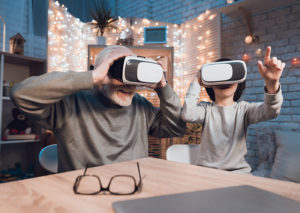
Imagine for a minute how it would feel to struggle with the cognitive complications of dementia. The people who are closest to you are no longer familiar. The words that would roll off your tongue without a second thought are now just beyond your grasp. In fact, the world as you once knew it has completely turned topsy-turvy, leaving you longing for a recognizable foothold.
One of the kindnesses imparted by dementia is the long-term memories that frequently remain intact long after short-term memories have disappeared. It is why connecting seniors with Alzheimer’s to the past is frequently an incredibly effective way to engage them – through music, photos, movies, and reminiscing. We can now add a high-tech tool to the ways we can help someone with dementia mentally engage with the past that’s demonstrating impressive results: virtual reality.
Skip Rizzo, director for medical virtual reality at the USC Institute for Creative Technologies, has been utilizing the technology to help veterans dealing with post-traumatic stress disorder. He’s now broadening his reach to older adults – beginning with his own 89-year-old mother, whose delightful reaction to a virtual trip to Rome confirmed just how effective the technology can be for older adults.
Rizzo shares an experience in which he visited a nursing home where a small group of residents were just sitting around a table in silence, until he began showing them flashcard-like pictures of objects they might recognize from their past. The transformation in the atmosphere was electric, as the seniors began sharing memories with each other. With the capacity of low-tech tools such as simple photographs to produce joy for older adults, just imagine the possibilities available to us now with high-tech options like virtual reality!
The advantage of virtual reality for older adults goes beyond just bringing enjoyment and boosting memory, including:
Improved Medical Care
The distraction of virtual reality is proving to be a powerful tool for easing physical pain for seniors. It can also be used to improve motor skills and balance and improve spatial reasoning. It may even help physicians identify health issues by watching how older adults respond in various activities and games.
Increased Socialization
We know that senior isolation is a contributing factor in a variety of physical and mental health problems. A recent research study by the National Academies of Sciences, Engineering and Medicine announced that as many as one in four seniors are feeling socially isolated. To address this concern, AARP Innovation Labs developed an app called Alcove, in which older adults and their friends and family can enjoy virtual reality experiences together.
It is always a good time to learn more creative options to improve quality of life for a senior you love. To help someone with dementia, contact the aging care experts from Independence-4-Seniors Home Care at (630) 323-4665 for more information or to schedule a free in-home assessment. With professionals trained in dementia care, and effective strategies for improving quality of life, families benefit from Independence-4-Seniors Home Care’s in-home care in Oak Brook and surrounding areas.
